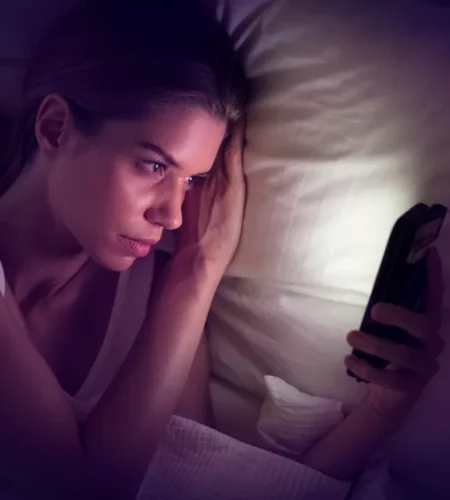In our always-connected world, it’s easy to fall into the habit of using digital devices right up until we go to bed. Whether it’s checking emails, scrolling through social media, or reading a book on an iPad or Kindle, screens have become a staple of our nightly routines. However, powering down before sleep is essential for better rest and overall well-being.
The Impact of Blue Light on Sleep
Digital devices emit blue light, which can interfere with the production of melatonin, the hormone responsible for regulating sleep. Exposure to blue light before bed can make it harder to fall asleep and affect the quality of your rest. You’re not going to get blue light out of your life (unless you move to a cabin in the woods and refuse to use electronic devices), so the trick to easing into sleep is timing your pull away from electronics in the evening.
Why Powering Down Matters
Powering down your devices before sleep helps signal to your brain that it’s time to wind down and prepare for rest. This can lead to improved sleep quality, reduced insomnia, and a more relaxed mind. Additionally, stepping away from screens can prevent the overstimulation that often comes with late-night internet browsing or social media engagement. There’s nothing wrong with cruising through Instagram in the evening, but the more you doomscroll the less likely it is you’re going to be able to get a good night’s sleep.
Solutions for Nighttime Readers
For those who love to read before bed, the idea of powering down might seem challenging. However, there are ways to enjoy your nighttime reading without the negative effects of blue light:
- Switch to Physical Books
- Reading a physical book instead of a digital one is an excellent way to wind down without exposing yourself to blue light. The tactile experience of holding a book can also be more satisfying and help you feel more connected to the content.
- Use a Blue Light Filter
- If you prefer digital reading, consider using a blue light filter on your device. Many tablets and e-readers have built-in features or apps that reduce blue light emissions. Setting these filters to activate automatically in the evening can help mitigate the impact on your sleep.
- Try E-Ink Readers
- E-ink readers, like certain Kindle models, are designed to mimic the appearance of paper and do not emit the same level of blue light as traditional tablets. These devices can be a good compromise for those who enjoy the convenience of digital books but want to reduce blue light exposure.
- Adjust Screen Brightness
- Lowering the brightness on your device can also help reduce the amount of blue light you’re exposed to. Pair this with night mode settings, which adjust the screen’s color temperature to warmer tones, making it easier on your eyes.
- Set a Reading Cut-Off Time
- Establishing a specific time to stop reading can help your brain transition into sleep mode. Aim to power down your devices at least 30 minutes to an hour before you plan to go to sleep. Use this time for other relaxing activities, such as meditation, gentle stretching, or listening to calming music.
Creating a Tech-Free Nighttime Routine
Building a nighttime routine that minimizes screen time can enhance your sleep quality and overall well-being. Here are some tips for creating a tech-free evening ritual:
- Dim the Lights: Lowering the lighting in your home in the evening can help signal to your body that it’s time to start winding down.
- Engage in Calming Activities: Consider activities like journaling, drawing, or gentle yoga to relax your mind and body.
- Set Boundaries: Establish clear boundaries with your devices. For example, keep your bedroom a tech-free zone by charging devices outside of the room.
- Prepare for the Next Day: Use the time before bed to plan and organize for the next day, which can help reduce anxiety and promote a sense of calm.
Powering down your devices before sleep is crucial for maintaining good sleep hygiene and overall health. While it can be challenging, especially for those who enjoy reading on digital devices, there are practical solutions to help you transition to a tech-free nighttime routine. By making small adjustments and being mindful of your evening habits, you can improve your sleep quality and wake up feeling more refreshed and rejuvenated.


